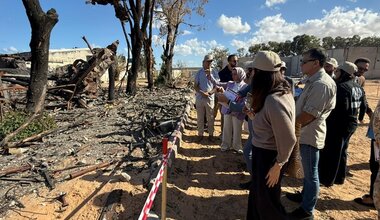Statement of the Co-Chairs (Netherlands, Switzerland and UNSMIL) of the International Humanitarian Law and Human Rights Working Group of the International Follow-up Committee on Libya on International Human Rights Day
‘Rights Commitments Should Be Central in Libya’s Ongoing Political Process’
On International Human Rights Day, the co-chairs of the Working Group on International Humanitarian Law and Human Rights under the Berlin process – the Netherlands, Switzerland and UNSMIL – welcomed the commitments made by participants of the Libyan Political Dialogue Forum (LPDF) to respect international humanitarian law and human rights.
“Respect for international humanitarian law and human rights must be at the centre of Libya’s peace process and should guide all aspects of its implementation,” the Working Group co-chairs stressed. “Tangible improvements in the lives of all those affected by the Libyan conflict depend on securing their safety and all their fundamental rights.”
The 75 participants of the LPDF, which took place from 9 to 15 November in Tunis, agreed to a roadmap that committed to the promotion and protection of human rights, emphasized equality between men and women and called for a comprehensive national reconciliation process based on the principles of transitional justice. Key rights principles for sustainable peace, developed by prominent members of Libyan civil society, were annexed to the roadmap. The current political process follows years of conflict, which has led to the continuous erosion of human rights and the rule of law, and entrenched impunity for serious human rights violations.
The Working Group co-chairs strongly support Libyan calls for the full implementation of the rights commitments in the roadmap. The co-chairs also underscored the need to promote respect for international humanitarian law and human rights as part of the process to implement the ceasefire agreement, including to combat hate speech and incitement to violence. As political talks continue, it is essential to ensure the meaningful participation of civil society, women and youth from across Libya, and to safeguard the rights of vulnerable groups, including the internally displaced, refugees and migrants, detainees and families of missing persons.
“Any political process that does not seek to advance human rights will ultimately fail”, the co-chairs warned. “Libyans are voicing the rights-centred approach needed for sustainable peace. It is up to the country’s leaders and international partners of Libya to support them.”
 United Nations Peacekeeping
United Nations Peacekeeping UN
UN









